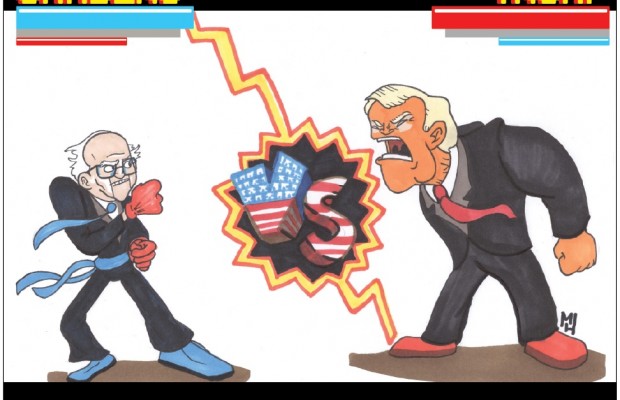Bernie today, Trump tomorrow? Candidate authenticity transcends the power of established parties in the 2016 election

The 2016 race for the presidency seems tilted in Democrat Hillary Clinton’s favor, but that may not be the case. According to a recent national poll from NBC news and the Wall Street Journal, a third of Social Democrat Bernie Sander’s supporters would rather vote for Republican candidate Donald Trump than Democratic candidate Hillary Clinton. This means that if a Trump and Clinton presidential race came to be, Trump could potentially gain a clump of the Democratic vote.
This statistic seems bizarre. There’s a significant ideological gap between Sanders’ social democratic populism and Trump’s conservative populism. Voting for a candidate so radically different from someone’s first choice seems illogical. However, this is assuming that the candidate’s ideology matters to the voters.
The politics of this election go far beyond party and label. Relatively unestablished politicians are leading the polls in their respective parties. In many ways, this election is a revolt against the established party members and political leaders which many see as corrupt and inept. It’s not so much that ideology matters, but the corruptibility from third party influence.
With corruptibility in mind, it’s clear that Trump has a better track record than Clinton. The email debacle, Benghazi, and her funding from super PACs and corporations make it easy for pro-transparency, anti-corporate political intervention, and pro-Bernie persons to antagonise Clinton. To Bernie advocates, Hillary is almost like another Republican candidate, and if that’s the case, why not vote for the right-winger that seems more genuine and less influenced by corporate donors?
Another reason for Bernie supporters choosing Trump over Hillary is the idea of destabilization. Destabilization is the intentional electing of candidates deemed inept in order to bring the country closer to an event that would kickstart a revolution. Radical leftists may see this as a plan B to move the Overton Window – the window of political possibility in a society – to the left in the case that the Sanders campaign fails, and their inept candidate of choice is Donald Trump. However, the radical left of the United States is such an extreme minority that they couldn’t swing an election.
But what is the chance of Bernie losing the Democratic primaries and that third of his supporters abandoning the party? Clinton is clearly in the lead delegate wise, but it’s important to remember that with delegate-dense states such as California still unpledged, Sanders has room to catch up.
Furthermore, the effect of superdelegates should not be overlooked. Hillary currently has the support of nearly eighty percent of the almost eight-hundred delegations, a rough third of delegations required for party support. With such a close race, the superdelegates may be the deciding factor for this primary – as was the case in 2008 when Barack Obama was behind Clinton in superdelegates right up to the Democratic Convention. In the 2008 election, the superdelegates abandoned Clinton at the last second and cast their votes for Obama. This could happen again in 2016 for Sanders if the Democratic superdelegates feel threatened by the zealously anti-Clinton Democrats who would rather vote for Trump.
Even with the somewhat autocratic will of the established Democrats, the ever-so-stubborn Sanders crusaders are the key to Bernie winning the Democratic nominee and even the presidency. The superdelegates will vote for whichever candidate most likely puts a Democrat in office, and if the Democratic masses make it clear that it’s Sanders or no one – Trump included – the establishment will cave.


